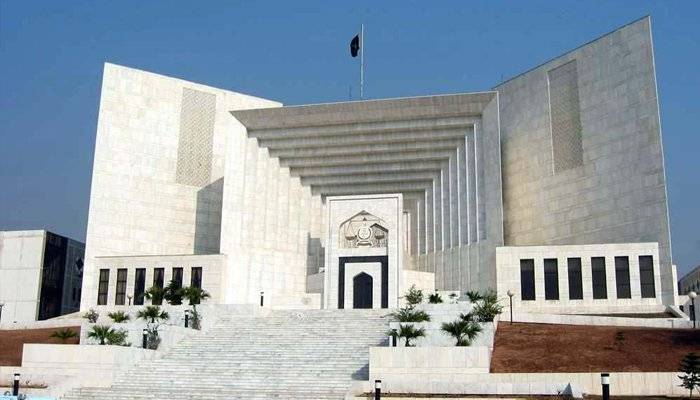
The Supreme Court has prohibited authorities from transferring and appointing new prosecuting officers in high profile criminal investigations and National Accountability Bureau (NAB) cases. The apex court said that the step was an effort to prevent the 'undermining of the functioning of criminal justice' in the country, as per the suo motu notice it took on Wednesday.
The court also issued notices to the Federal Investigation Agency (FIA) director general, the NAB chairman and the interior secretary, asking them for reasons as to the alleged 'interference' in the court proceedings of criminal cases involving 'persons of authority', ordering them to refrain from withdrawing such cases.
The orders were issued by a five-member bench comprising Chief Justice of Pakistan (CJP) Umar Ata Bandial, Justice Ijazul Ahsan, Justice Munib Akhtar, Justice Sayyed Mazahar Ali Akbar Naqvi and Justice Mohammad Ali Mazhar.
Chief Justice Bandial had on Wednesday taken suo motu notice of the 'percieved interference’ in the accountability processes of high-profile cases.
The SC asked NAB and FIA to provide them with a record of the all transfers and postings of individuals involved in the investigation and prosecution departments from the past six months.
The CJP also issued orders for the records of high profile cases to be sealed and protected, at which Attorney General for Pakistan (AGP) Ashtar Ausaf protested saying it would lead to a delay in cases. The Chief Justice clarified that the records of on-going cases would not be sealed, only those of the prosecution.
The bench also expressed concern over the removal of "thousands" of names from the Exit Control List (ECL), saying that there needs to be 'transparency' in the accountability process.
"The suo motu notice is meant to protect the criminal justice system and the rule of law," the CJP said, adding that it wasn't meant to single out one individual, or embarrass anyone.
The bench said they were uneasy about the transfer and subsequent death of former FIA director general Mohammad Rizwan, saying that these developments indicate 'interference'.
The judges said they expected the federal government to cooperate and explain these facts, as this was a matter of "dignity, honour and respect of the investigation process."
"We are not doing this for point-scoring. We will not be affected by any kind of criticism," said CJ Bandial.
The court also issued notices to the Federal Investigation Agency (FIA) director general, the NAB chairman and the interior secretary, asking them for reasons as to the alleged 'interference' in the court proceedings of criminal cases involving 'persons of authority', ordering them to refrain from withdrawing such cases.
The orders were issued by a five-member bench comprising Chief Justice of Pakistan (CJP) Umar Ata Bandial, Justice Ijazul Ahsan, Justice Munib Akhtar, Justice Sayyed Mazahar Ali Akbar Naqvi and Justice Mohammad Ali Mazhar.
Chief Justice Bandial had on Wednesday taken suo motu notice of the 'percieved interference’ in the accountability processes of high-profile cases.
The SC asked NAB and FIA to provide them with a record of the all transfers and postings of individuals involved in the investigation and prosecution departments from the past six months.
The CJP also issued orders for the records of high profile cases to be sealed and protected, at which Attorney General for Pakistan (AGP) Ashtar Ausaf protested saying it would lead to a delay in cases. The Chief Justice clarified that the records of on-going cases would not be sealed, only those of the prosecution.
The bench also expressed concern over the removal of "thousands" of names from the Exit Control List (ECL), saying that there needs to be 'transparency' in the accountability process.
"The suo motu notice is meant to protect the criminal justice system and the rule of law," the CJP said, adding that it wasn't meant to single out one individual, or embarrass anyone.
The bench said they were uneasy about the transfer and subsequent death of former FIA director general Mohammad Rizwan, saying that these developments indicate 'interference'.
The judges said they expected the federal government to cooperate and explain these facts, as this was a matter of "dignity, honour and respect of the investigation process."
"We are not doing this for point-scoring. We will not be affected by any kind of criticism," said CJ Bandial.

